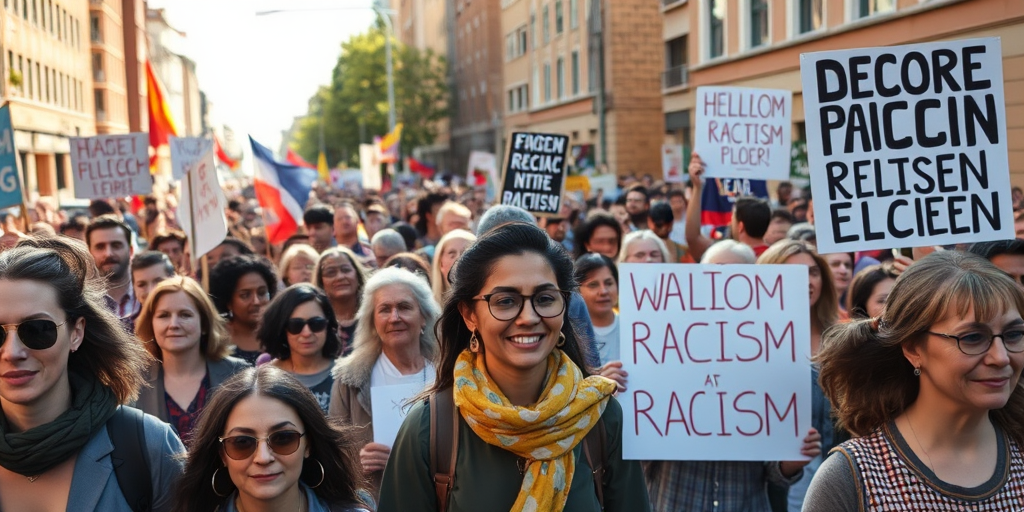**Saluting Those in the Fight Against Racism: Unity in Diversity?**
Thousands of individuals in Hamburg joined forces over the past weekend, showcasing their solidarity against racism and discrimination by participating in a vivid anti-racism parade. Captured through the lens of photographer Rasande Tyskar, the event served as a powerful reminder of the ongoing need to combat discrimination not just in Europe but globally.
A Grassroots Movement Takes Center Stage
This parade in Hamburg is part of a broader movement seen across the European Union, where grassroots organizations and individual activists have taken the helm in leading anti-racism advocacy. As detailed in “The EU’s Unsung Heroes,” a poignant magazine article by Elena Sánchez Nicolás, the fight against racism in the EU is driven less by top-down governmental directives and more by diverse community efforts. The article, available through EUobserver, underscores the decentralized and multifaceted nature of activism in Europe — a crucial detail, as diversity advocacy cannot rely on a singular narrative or authority figure.
Linking Local and Global Efforts
For readers of Woke News in the United States, these efforts in Europe offer an interesting lens into the nature of advocacy that is not unfamiliar to many local communities. In American towns and cities alike, the impetus for change often emerges from grassroots endeavors. Across both continents, there remains a pressing need for a collective, sustained effort to address systemic racism and discrimination.
Michael O’Flaherty of the European Union Agency for Fundamental Rights has voiced concerns regarding the troubling state of human rights in Europe. His remarks resonate with issues faced by American communities, where racial inequality persists as a deep-seated societal challenge. Similar concerns have arisen in relation to LGBTI protections and incidents of Islamophobia in both regions.
The Local Impact: Resonating with American Communities
Hamburg’s parade and the accompanying article by Sánchez Nicolás remind us that no community is isolated from the bigotry and discrimination that affect us globally. For many Americans, especially those in ethnically diverse cities, the stories of unity and resilience coming from Hamburg offer both inspiration and a stark reminder that these battles are widespread and interconnected.
Local advocacy groups in the U.S. have long echoed similar themes, calling for more community-focused solutions and emphasizing the importance of public participation in bringing about change. Residents in cities like New York and Los Angeles can find parallels in the way European activists aim to foster inclusive environments, making the issue of racial justice a universal cause rather than a fragmented struggle.
Balancing Perspectives: An Ongoing Dialogue
While the parade in Hamburg highlights committed efforts toward equity, it also prompts further discourse on the execution of anti-discrimination strategies. Critics might argue that decentralized activism lacks the cohesion needed for systematic reform. Conversely, proponents maintain that grassroots movements are precisely where the most effective change begins, advocating for policies that stay true to community-specific needs.
As Americans reflect on this, the synergy between governmental programs and community efforts remains paramount. Balancing these dynamics, ensuring resources are effectively allocated, and maintaining transparent dialogues are essential components for meaningful progress.
Looking Forward: The Implications of a Global Anti-Discrimination Network
The extensive participation in the Hamburg parade and the insights gathered in “The EU’s Unsung Heroes” paint a hopeful picture of solidarity transcending borders. Such events strengthen the potential for international collaboration in crafting more inclusive societies. For communities in the United States, this is a call to engage with global partners, learning from each other’s successes and challenges.
To that end, organizations and leaders committed to social justice can find innovative ways to collaborate across cultural lines, drawing from shared experiences to enhance strategies and policy frameworks. Furthermore, it offers a unique opportunity for educators to incorporate global perspectives into curriculums, enriching discussions around race, identity, and equality at all levels of society.
Connecting with Local Resources
For those who want to contribute or learn more about the fight against discrimination both locally and internationally, community members are encouraged to engage with local advocacy groups. Many cities offer resources and volunteer opportunities aimed at fostering inclusivity — a commitment evident in educational workshops, cultural events, and policy advocacy efforts.
Ultimately, these combined efforts underscore the power and necessity of a united stand against racism. As both Hamburg’s parade and EUobserver’s article affirm, meaningful change is contingent upon both recognizing diversity and collectively addressing the injustices that persist within our societies.







